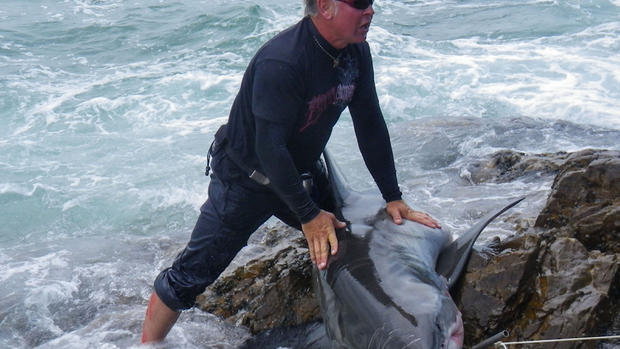Long Island tradition changes to save the sharks
(CBS News) MONTAUK, N.Y. -- Off the coast of New York's Long Island this weekend, the sharks were biting.
Shark tournaments have been popular in the area for decades and they've always ended with dead sharks on the dock. This year, there's a difference.
Sixty-four sharks were reeled in this weekend during a tournament about 20 miles off the coast of Montauk. For the first time ever in the long, bloody history of shark tournaments in this area, all of the sharks were released.
NY fisherman survives 12 hours lost at sea with help of boots
Mass. man fights shark and brings it to shore
Shark kills teenage girl near Indian Ocean beach
Jason Behan, a third-generation fishing captain, has been catching and killing sharks in the area since he was a young boy.
He says there's a whole different mood in a tournament where you're not killing sharks.
"In a tournament like this ... it's going to change a lot of people's minds and it's going to open a lot of people up to 'Hey, there is another way to do this,'" said Behan.
The town of Montauk is where America's shark fishing frenzy began in the 1970s, led by legendary local fisherman Frank Mundus, who served as the model for the shark hunter Quint in the blockbuster movie "Jaws."
"After the movie 'Jaws' came out, we wanted to get as close to them as we could," said Sean Paxton.
Tournament organizers Sean and Brooks Paxton, known as the shark brothers, started out killing sharks but have been advocating catch-and-release for more than a decade.
"We realized after a while that we could still enjoy the sport, but do it in a more sustainable way," said Sean Paxton.
"Sharks are very much in trouble. Certain numbers, certain species are down 80 to 90 percent since the late '60s, early '70s. They need some help," said Brooks Paxton.
Much of the problem is due to demand in Asia for shark fin soup. But the Paxton brothers say changing the culture of recreational shark fishing would also make a difference.
"Sport fishermen are taking them as trophies, and that's the end of it. It's a wasteful practice and one of the biggest causes for the declining population," said Sean Paxton.
Satellite tracking devices were attached to four of the sharks caught at this tournament. One, a seven-foot-250-pound blue shark, was named Beamer by the local sixth grade class, which plans to track his travels on line.
"That's the beauty of satellite tags, because any kid anywhere in the world can go on and track these fish. They could catch a fish here in Montauk today and it could be in Cuba in a few months, it could be in Florida, it could be anywhere. And just the fact kids can see where these fish migrate and keep them interested -- that's what we want to get, the next generation to care about these fish," said Brooks Paxton.
Sharks play a crucial role in the marine ecosystem and even creatures with teeth sometimes need a little tender loving care.


